Sunday Apr 20, 2025
Sunday Apr 20, 2025
Monday, 20 November 2017 00:05 - - {{hitsCtrl.values.hits}}
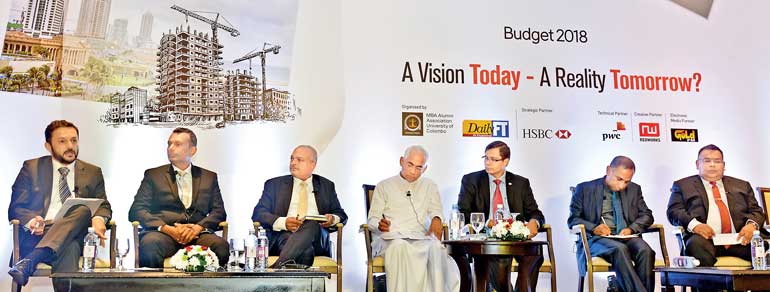
By Uditha Jayasinghe
Sri Lanka’s private sector weighed in with their views on Budget proposals as well as overall reforms and policy changes that need to be implemented to foster growth across multiple sectors at the Daily FT-Colombo University MBA Alumni Association organised Post Budget Forum for which HSBC was the strategic partner.
Giving wide-ranging views and ideas on policy and investment were Siam City Cement Chief Financial Officer Bruno Pitzini, Teejay Lanka Managing Director Sriyan de Silva Wijeyeratne, Ansell Lanka Country Director Hasitha Prematillake and Tropic Forzen Foods Chief Executive Officer Roshan Fernando. Macroeconomic impact
From a macroeconomic perspective efforts by the Government to control interest rates and inflation were welcomed as it would keep consumption growing, particularly for industries such as cement that depend on retail for 75% of their market share. As much as 55% of the market is individual house builders and as such would be very sensitive to any change in the availability of credit as they do not have the capacity to fund their own projects.
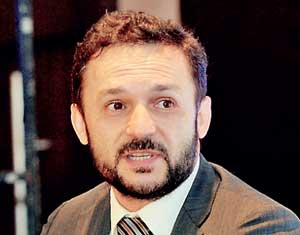 “As much as 55% of the market is individual house builders and as such would be very sensitive to any change in the availability of credit as they do not have the capacity to fund their own projects. We could see when there was a hike in the interest rate that projects were stalling - Siam City Cement Chief Financial Officer Bruno Pitzini
“As much as 55% of the market is individual house builders and as such would be very sensitive to any change in the availability of credit as they do not have the capacity to fund their own projects. We could see when there was a hike in the interest rate that projects were stalling - Siam City Cement Chief Financial Officer Bruno Pitzini
“We could see when there was a hike in the interest rate that projects were stalling. The proposal to build 20,000 houses and the urban construction projects are positive, even though they may take a few years. Lifting restrictions on foreigners to buy apartments below the fourth floor should also have a positive impact for us but imposing VAT would have a negative impact and as of now we are not sure what the result will be,” said Siam City Cement Chief Financial Officer Bruno Pitzini.
Backing local investment
Sri Lanka has a vision to grow exports to $ 20 billion and even though the Budget has a lot of proposals progressive taxation and incentives for investment was advocated by Ansell Lanka Country Director Hasitha Prematillake. He also noted that as local labour has to increase its skills proposals to increase vocational training to improve technical skills in the Budget was a positive step that would support the country’s efforts of development.
“Ansell has enjoyed a 30-year tax holiday for a $ 100 million investment and in the last three years we have invested $ 100 million more but that has been without any extra incentive. We have asked the Government for assistance but they have said that if we establish another company, it will be possible, but that is difficult to do for a multinational,” he said.
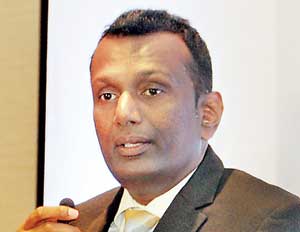 Countries like Vietnam have progressive incentives and that is why Ansell is keen to invest there, because for 20% investment they give additional two years tax holiday and another four years at 50% rate. Such policies will keep FDI in the manufacturing sector; we would like to see similar measures in Sri Lanka Ansell Lanka Country Director Hasitha Prematillake
Countries like Vietnam have progressive incentives and that is why Ansell is keen to invest there, because for 20% investment they give additional two years tax holiday and another four years at 50% rate. Such policies will keep FDI in the manufacturing sector; we would like to see similar measures in Sri Lanka Ansell Lanka Country Director Hasitha Prematillake
“However, countries like Vietnam have progressive incentives and that is why Ansell is keen to invest there, because for 20% investment they give additional two years tax holiday and another four years at 50% rate. Such policies will keep FDI in the manufacturing sector; we would like to see similar measures in Sri Lanka.”
For Teejay Lanka Managing Director Sriyan de Silva Wijeyeratne implementation was an important point as the previous Budgets had struggled with that aspect and much depended on the latest version actually having an impact. He also insisted that the main thing for the apparel industry at this point was stability and clarity regarding Budget 2018 tax changes.
“We are seeking clarity on some tax changes linked to apparel. As you know the apparel industry accounts for 50% of exports and it’s under intense pressure globally, so the last thing you want is to kill the golden goose at this point just to eke out a little bit more tax from this industry,” he said.
“There is a lot of focus on FDI rather than growing the size of industry. These are two very different things. It is going to be much easier for us as a country to add on a billion dollars in apparel than to spend the next 10 or 15 years trying to nurture new industries. It’s not that we shouldn’t do that, diversification is important, but there should be equal focus on how we add extra volume to existing large scale industries. “
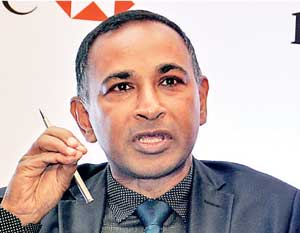 There is a lot of focus on FDI rather than growing the size of industry. These are two very different things. It is going to be much easier for us as a country to add on a billion dollars in apparel than to spend the next 10 or 15 years trying to nurture new industries. It’s not that we shouldn’t do that, diversification is important, but there should be equal focus on how we add extra volume to existing large scale industries - Teejay Lanka Managing Director Sriyan de Silva Wijeyeratne
There is a lot of focus on FDI rather than growing the size of industry. These are two very different things. It is going to be much easier for us as a country to add on a billion dollars in apparel than to spend the next 10 or 15 years trying to nurture new industries. It’s not that we shouldn’t do that, diversification is important, but there should be equal focus on how we add extra volume to existing large scale industries - Teejay Lanka Managing Director Sriyan de Silva Wijeyeratne
Wijeyeratne acknowledged that some efforts to incentivize existing industries had been proposed by the Government but pointed out that the blocks of investment were too large for most local companies.
“If I’m not mistaken the blocks are from $ 50million-$ 100million and so on. These are massive blocks So if the smaller $ 20million or $ 30 million dollar investments are noted and incentive packages are tailored accordingly you could easily find the existing companies in apparel investing heavily for tax benefits and in a few years you could add on $ 1 billion easily to the top line.”
Tax principles
In response State Minister of Finance Eran Wickramaratne detailed the thought process of the Government in formulating investment incentives. He also acknowledged that interest rates and inflation are a concern but expressed confidence in the Central Bank to tackle the two macroeconomic elements successfully, predicting that inflation would slow down in the second half of 2018 as the impact from natural disasters and tax increases ebbs.
“We have moved away from the concept of tax holidays because international studies show that investors make decisions based on a host of issues, which obviously include tax holidays but also other reasons. The exemptions we have given are about 1.6% of our GDP annually but the FDI we are getting is less than 1%, so obviously it raises the question what are we really to do?”
Wickramaratne outlined that the Government strategy was focused on looking at all the points in the Ease of Doing Business Index published by the World Bank, which focuses on approvals, land, utilities, energy costs, corruption and bankruptcy among others as key considerations for investors.
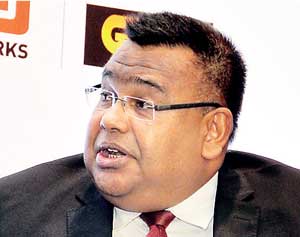 Expanding the Seafood contract packing currently undertaken by Sri Lankan processors based on NFE transactions or imported without payment in foreign exchange out of Sri Lanka is no longer viable as the processing industry has to depend on regionally competitive labour costs for profit, which is not competitive anymore - Tropic Forzen Foods Chief Executive Officer Roshan Fernando
Expanding the Seafood contract packing currently undertaken by Sri Lankan processors based on NFE transactions or imported without payment in foreign exchange out of Sri Lanka is no longer viable as the processing industry has to depend on regionally competitive labour costs for profit, which is not competitive anymore - Tropic Forzen Foods Chief Executive Officer Roshan Fernando
“We have some real issues that we recognize we have to deal with and we are giving tax holidays, which are included in the Inland Revenue Act that allows new investors to recoup their investment before they start paying tax with additional allowances if investment is in the Northern Province.”
Major sticking points on implementation would be around legal reforms and liberalisation, predicted the minister, who conceded that getting different political parties on the same page would be a challenge that could result in delays.
Entrepreneurship excesses
The Budget has earmarked Rs. 15 billion in loans for entrepreneurs but their disbursement and the transparency in the process was questioned by the audience. The Minister in response assured that the Government would do its utmost to give capital to successful ventures but admitted some losses would be inevitable.
“There is an element of write-off. We are not approaching this believing everything will work out. In industries such as IT this happens automatically in that angel funds nurture successful ventures and let go of others but this is not so developed in other areas. In the design of it, to the extent possible, is to use the banking system. I think the chances of getting a good result are better than a direct Government handout. The problem with this is that the banks have limits on who they can reach. How the banking system will be used and whether we will include microfinance is something we have to look at.”
Returning to the various trade agreements being negotiated by the Government Wickramaratne reiterated the Government’s stance that they would not allow the free flow of foreign workers into Sri Lanka. However, he noted that there were two sides to the issue with certain stakeholders being dead against opening the labour market but also appealing to the Government when they run short of experts to allow foreigners to work in select positions. Efforts to address this issue had resulted in a whiplash of criticism towards the Government, recounted the Minister.
Labour moves
“But we also have the industry coming and saying, “We need a specialist here and a specialist there.” When we apply to the immigration controller, he writes to the line ministry and the ministry writes to the institution under it and by the time we get our answer its nine months. Either we have closed the business or it has gone overseas. So we suggested that the industry could streamline its skills need and if a pre-approval process is put in place then all that needs to be done is to update the list and let it grow in a responsible and organic way. Then people jumped up and said “we are under threat. You are letting foreigners in, what’s going on?” I want to tell you clearly that in our trade negotiations there is no free movement of professionals.”
The Free Trade Agreements (FTAs) being discussed with Singapore and China are “looking deeper than that,” he said for investment, new markets and skills.
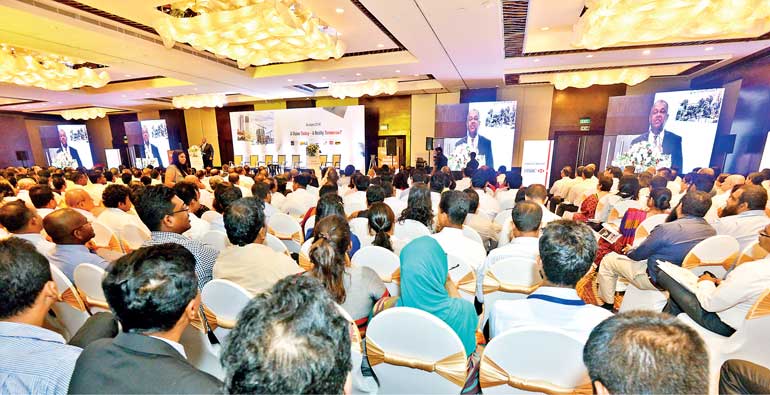
Adding his views to the discussion Teejay Lanka Managing Director Sriyan de Silva Wijeyeratne recalled that twenty years ago the private sector was wary of the IT industry coming in and stealing jobs and it would be sad that if this very industry was now seeking protection.
He pointed out that in the next two decades the most powerful and richest companies in the world would be those that championed technology and Sri Lanka should position itself to make use of such a change in circumstances. He pointed out that Sri Lanka has missed wave upon wave of chances of tapping into not just the IT industry but also developing existing and new businesses.
“If we are not careful we will be patting each other on the back about a $1billion or $1.5 billion industry in a few years and not asking ourselves why we missed an industry worth $10 billion or $20 billion,” he said.
Fishing industry
The Budget proposals, to incentivise the building of boats and harbours as well as other infrastructure for the fishing industry, if implemented, is expected to increase production in the long term, said Tropic Forzen Foods Chief Executive Officer Roshan Fernando outlining the opportunities and challenges for the industry.
“It is suggested that in keeping with the Government’s aspirations of making Sri Lanka a Hub of the Indian Ocean and the recent FAO Fisheries Port State Measures (PSM) agreement (where transhipment of fish mid sea is restricted) a new window has been opened for Sri Lanka to act as a Port State, enabling catches of the Indian Ocean to be landed in Sri Lankan Ports for reprocessing and exported to international markets.”
Fernando pointed out the Sri Lanka seafood export industry incurs a substantial overhead to be certified and maintain international standards in addition to employing the latest state of the art technology for processing and value adding seafood.
“Expanding the seafood contract packing currently undertaken by Sri Lankan processors based on NFE transactions or imported without payment in foreign exchange out of Sri Lanka is no longer viable as the processing industry has to depend on regionally competitive labour costs for profit, which is not competitive anymore,” he said.
He proposed that allowing the local seafood processing industry to import raw material for value addition and re -exporting by removing or revising the ESC (0.5% of turnover), will give the opportunity to the Sri Lankan processors to import raw material from the international catches , employ technology and marketing initiatives to retain increased taxable profits in Sri Lanka.
Discover Kapruka, the leading online shopping platform in Sri Lanka, where you can conveniently send Gifts and Flowers to your loved ones for any event including Valentine ’s Day. Explore a wide range of popular Shopping Categories on Kapruka, including Toys, Groceries, Electronics, Birthday Cakes, Fruits, Chocolates, Flower Bouquets, Clothing, Watches, Lingerie, Gift Sets and Jewellery. Also if you’re interested in selling with Kapruka, Partner Central by Kapruka is the best solution to start with. Moreover, through Kapruka Global Shop, you can also enjoy the convenience of purchasing products from renowned platforms like Amazon and eBay and have them delivered to Sri Lanka.
Discover Kapruka, the leading online shopping platform in Sri Lanka, where you can conveniently send Gifts and Flowers to your loved ones for any event including Valentine ’s Day. Explore a wide range of popular Shopping Categories on Kapruka, including Toys, Groceries, Electronics, Birthday Cakes, Fruits, Chocolates, Flower Bouquets, Clothing, Watches, Lingerie, Gift Sets and Jewellery. Also if you’re interested in selling with Kapruka, Partner Central by Kapruka is the best solution to start with. Moreover, through Kapruka Global Shop, you can also enjoy the convenience of purchasing products from renowned platforms like Amazon and eBay and have them delivered to Sri Lanka.